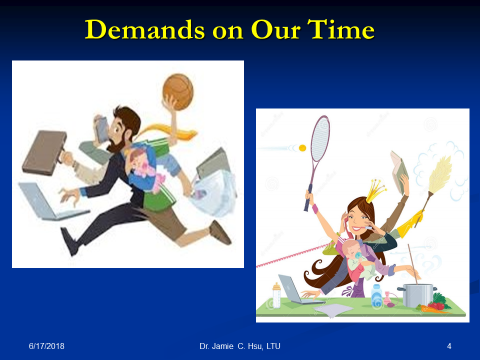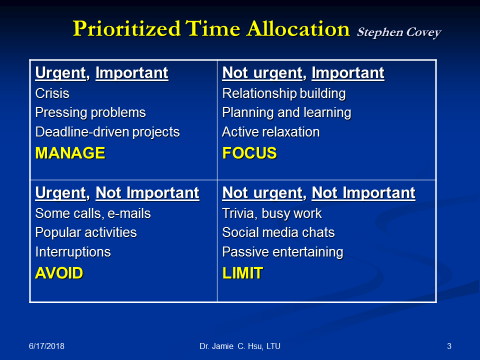
How Do You Spend Your Time?
– Musings of Dr. Jamie C. Hsu, 6.20.2018
Recently, several participants in my seminar wanted to know more about time management. So I am sharing here what I have learned from my personal experience and what Stephen Covey has taught us about time management.
When I first became a supervisor at work, I found the demands on my time were unreasonably high. In particular, my boss seemed to continuously give me assignments and to-do items that were detrimental to my personal time. I decided to arm myself with facts so I could complain to her. After a whole month of data gathering and detailed time-logging, I was shocked to find that the “endless special requests” from her only took 15% of my time. My own perception and emotion made the situation seem much worse than reality. I learned that facts and data are important before jumping to conclusions. Since then, I regularly and objectively review where I spend my time and have learned how to prioritize.
A good time management tool is provided in Stephen Covey’s book “The 7 Habits of Highly Effective People.” As depicted in the four quadrants of the chart, our time can be spent on important/unimportant or urgent/non-urgent matters. It is obvious we have to take care of important and urgent tasks such as illness or project deadlines. We also need to take care of urgent but not necessarily important tasks such as answering a phone call or responding to a boss’s email questions.
Often times, we may find the shocking truth about how much time we spend on non-urgent and unimportant routines like watching a lot of ball games, following many tweets and social media postings, or watching tabloid news. And then we’ll complain that we don’t have enough time for the important, yet non-urgent tasks of relationship-building, self-improvement, financial planning, or family gatherings.
This honest, hard look at how we allocate our time will undoubtedly unveil some painful surprises. Facing the truth and making some hard decisions will give us more time to take care of the important matters in life and reduce many future crises and stresses.


花時間的態度
-作者 許俊宸博士
-中譯 薛乃綺
最近,在我的演講會上遇到幾位參加者,想要了解更多有關時間管理的議題。於是,我想分享一些個人經驗,以及從美國著名的管理學大師Stephen Covey 那邊學習到的有關時間管理的二三事。
當我第一次當上主管的那個時候,我發現工作對我時間的要求實在是高的不像話。尤其我的老闆還不斷分配給我一堆额外任務跟待辦事項,這根本大幅影響了我自己的時間。為了保護自己,我打算蒐集實證,以便向她抱怨這種狀況。經過一個月的數據蒐集及詳盡的時間記錄,我訝異地發現,她的”無止盡的额外工作清單要求”,只花了我15%的時間。反倒是我自己的看法及情緒反應,讓整個狀態看起來比實際情況糟糕。我學到了一件事,在下結論之前,對於事實及數據的了解非常重要。從那之後,我會定期且客觀的回顧自己在哪裡把時間花掉了,並且學習如何將事情進行優先順序的考量。
Stephen Covey在他的「成功者的7个习惯」這本書裡,提供了一個很好的時間管理工具。就是在圖表中四個象限表達的那樣,我們的時間可以用重要/不重要、緊急/非緊急來做為區分。顯然我們必須要優先處理像是生病或專案期限這種重要且急迫的事情。我們還會處理一些緊急,但不一定非常重要的任務,例如接聽電話、或回覆老闆的email。
很多時候,我們可能會因此發現許多令人驚讶的事情:比如說,我們花了很多時間在做些非緊急,而又不重要的琐事;像是看一大堆球賽、追推文及Line、看八卦雜誌等等。然後才又來抱怨,自己沒有時間來維持人際關係、參加家庭聚會,做自我改善等這些重要但非急迫的事情。
用這種嚴肅的態度,誠實地來看自己對時間的管理時,是會帶來一些苦澀的驚讶。但面對現實並且做出艱難的決定後,將會帶給自己更多時間來照顧生活中更多重要的事情,還能減少許多未來可能會遭遇的困境及壓力。


